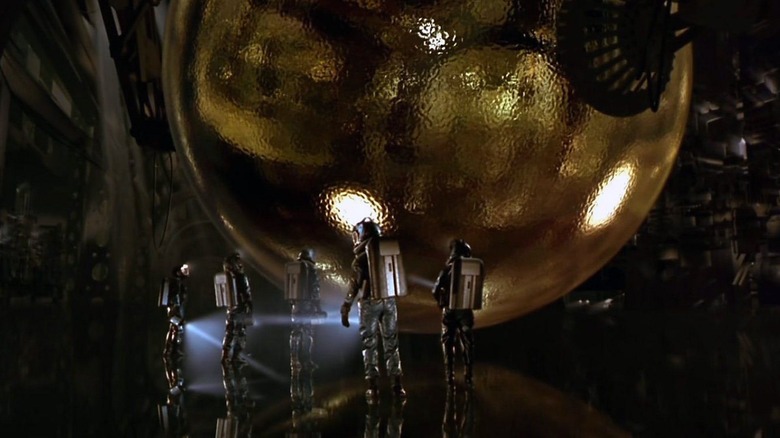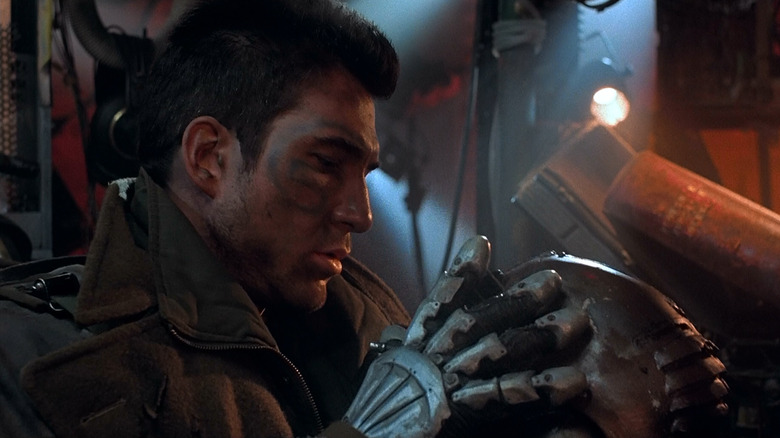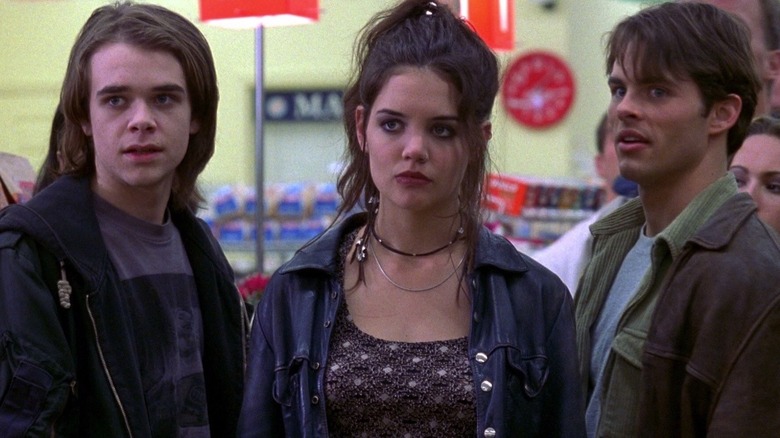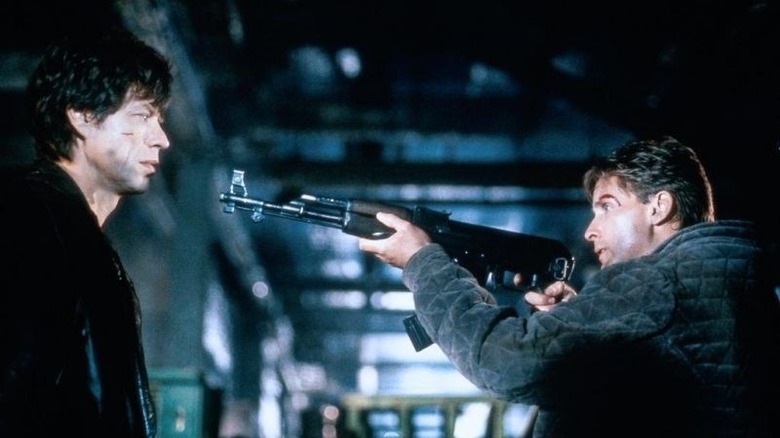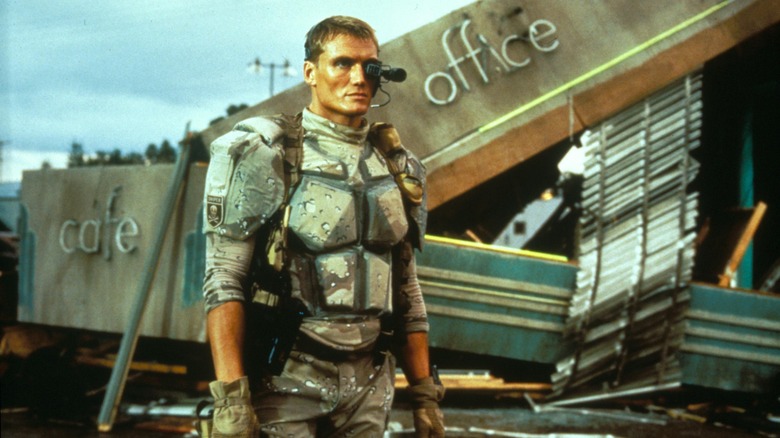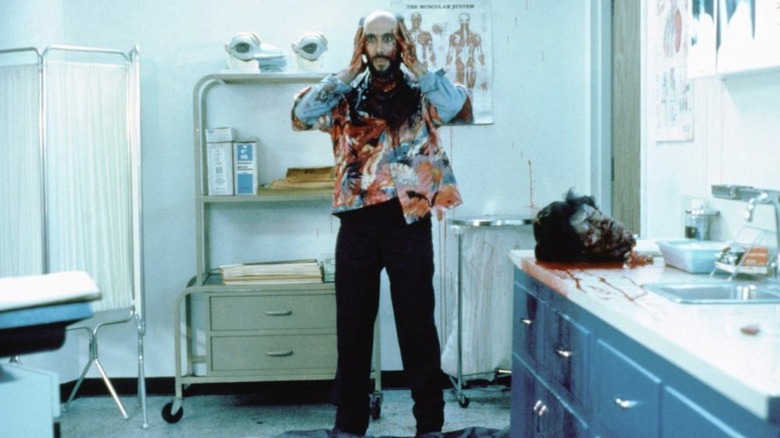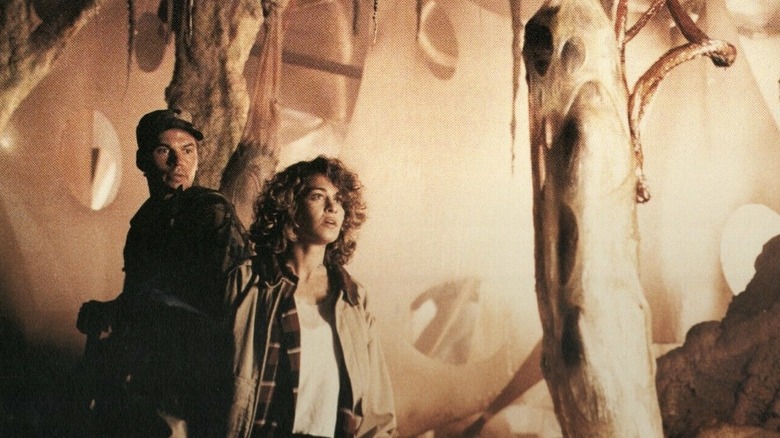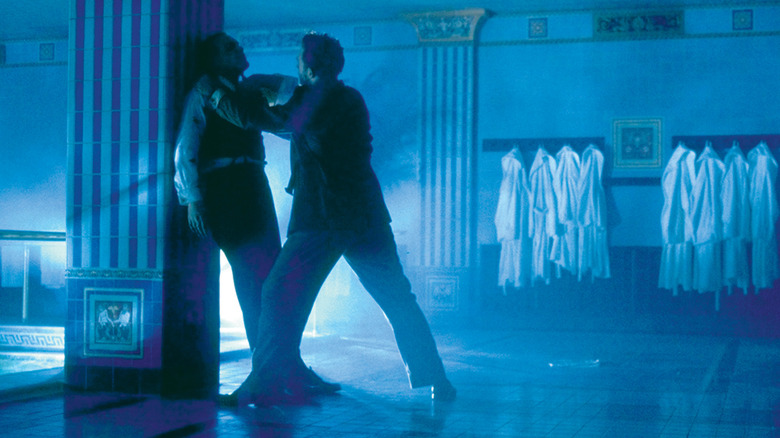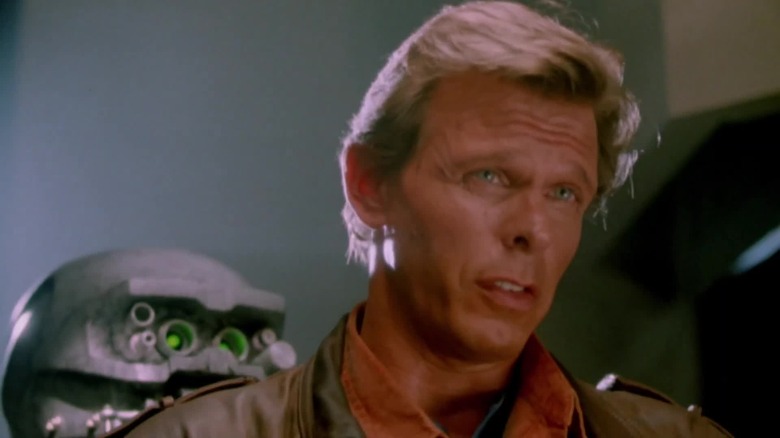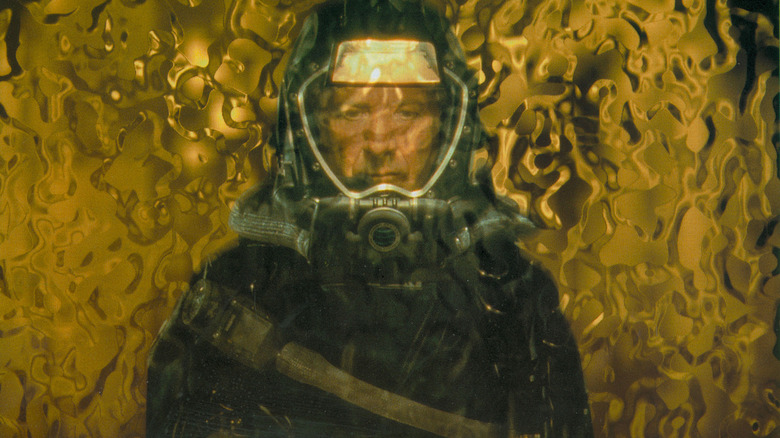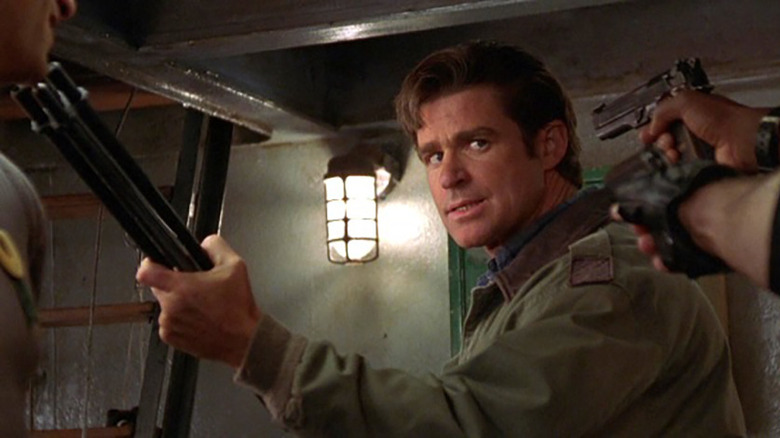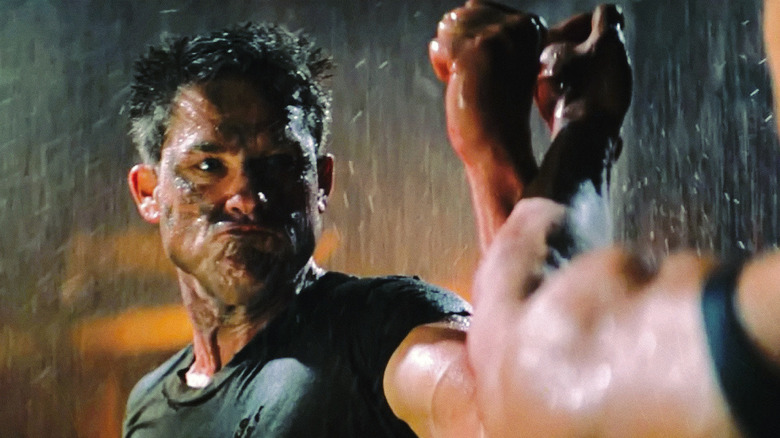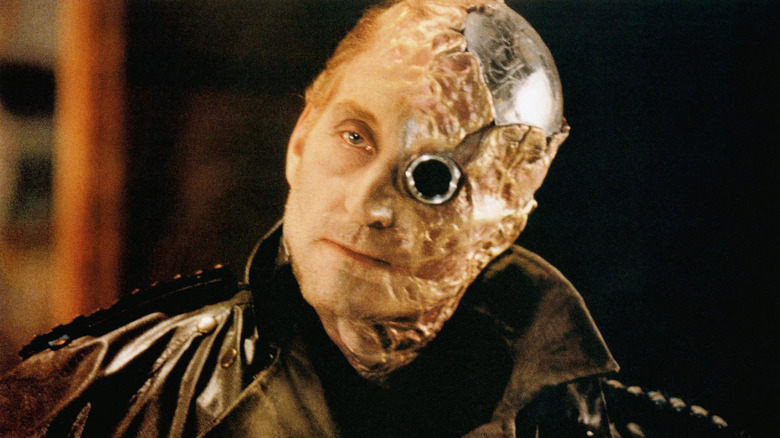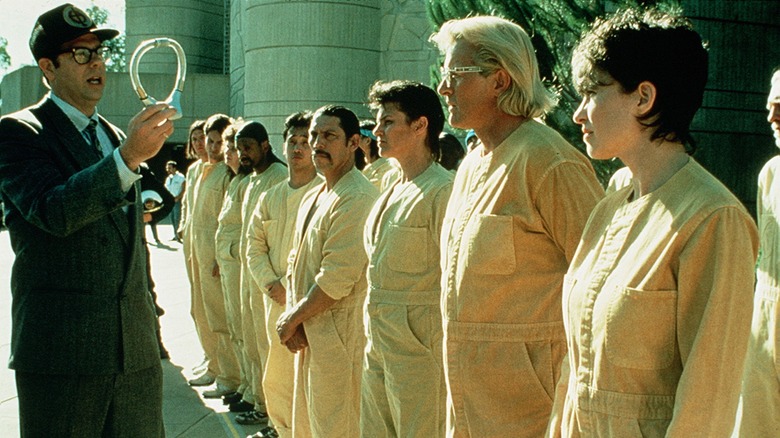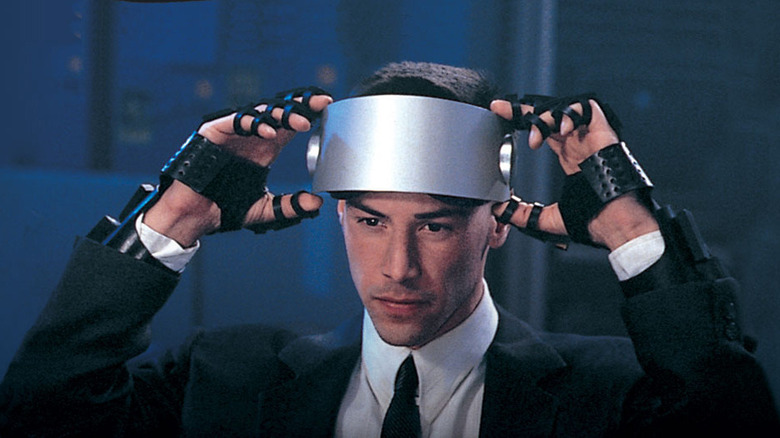90s Sci-Fi Movies With Awful Reviews That Are Actually Worth Watching
The 1990s were full of top-notch science fiction films that won over critics and set the box office on fire — after all, we're talking about a decade that produced "Independence Day" (which beat "Mars Attacks!" to theaters), "The Matrix" (albeit with some complex behind-the-scenes activity), "The Fifth Element" (ripping off Plato to great effect) and the list goes on and on. But not every sci-fi release can be a winner, and the decade also had its fair share of stinkers. Whether they were derivative of other (better) films, hacked to pieces as a result of studio interference, or let down by the limitations of 1990s technology, there are endless reasons why an ambitious science-fiction project might crash and burn.
However, many of these ambitious but panned sci-fi movies are often not without their redeeming factors, and despite their negative reception — especially on Rotten Tomatoes — you can often pick out fascinating nuggets contained within that make them worth exploring. As a result of their uniquely '90s blend of practical and special effects, they have a certain swing-for-the-fences quality that gives even lesser efforts a level of appeal often lacking in more modern bombs. Prepare to suspend your disbelief and embrace the high-concept narrative — these are the best sci-fi films from the 1990s that were savaged by the critics.
Hardware – 46%
Directed by Richard Stanley, who up until this point in his career was best known for his music video sensibility, "Hardware" stars Dylan McDermott as Moses Baxter. He gives his girlfriend a bunch of loose robot parts to contribute to her tech-based sculpture, only to discover that he has inadvertently created a monster. The components are capable of autonomous reassembly, and the resulting android is blood-thirsty, to say the least.
Critics back in 1990 were not kind to the film — Owen Gleiberman of Entertainment Weekly referred to it as what would happen if "someone had remade 'Alien' with the monster played by a rusty erector set," and the film sits with a 46% on Rotten Tomatoes.
Aside from negative reviews from critics, "Hardware" had a lot stacked against it, especially the legal problems it faced. The creators of "Hardware" were successfully sued by Fleetway Comics, who published a comic strip years earlier that bore a remarkable similarity to the plot of the film. It certainly wasn't helped by the fact that, in the early 2000s, at a time when many other sci-fi action thrillers from the 1990s were experiencing a critical reappraisal, its DVD release was held back until 2009, due to lawsuits, severely limiting the number of people who could actually watch it.
Looking back decades later, it's easier to appreciate the merits of "Hardware," from its innovative cyberpunk aesthetic to the South African director's powerful — if not particularly subtle — commentary on the evils of fascism and apartheid.
Disturbing Behavior – 33%
When you look at the subgenre of late 1990s teen science fiction horror films, "Disturbing Behavior" slots right in among better-known movies like "The Faculty" (another critically panned movie worth your time) It stars a young Katie Holmes, James Marsden, and Nick Stahl as a trio of misfit teens who begin to realize that there's something very strange going on at their high school. They watch their fellow outcasts transform into perfect, high-achieving automatons with plenty of school spirit seemingly overnight, changes that can only be ascribed to some kind of nefarious brainwashing scheme perpetrated by the adults in their lives.
Like many other films that wind up critically lambasted (it has a 33% on Rotten Tomatoes), "Disturbing Behavior" was the victim of extensive MGM cuts to the original version handed in by director David Nutter. He claims that they were interested in making changes to the film to capitalize on the popularity of "Scream," and he was so disappointed with the final product that he briefly considered asking to have his name taken off the film. Still, "Disturbing Behavior" has a fantastic up-and-coming cast and a promising narrative that serves as a throwback to 1950s teen sci-fi films. Who knows — maybe one day we'll even get the director's cut that fans have been clamoring for, which could really give "Disturbing Behavior" a proper critical reevaluation.
Freejack – 25%
No, your eyes are not deceiving you. That is indeed Mick Jagger in the picture above, starring as the villain in the futuristic sci-fi thriller "Freejack," and he might just be the most compelling reason to give the film a chance, despite its 25% critical score. After all, how often do you get the opportunity to see Jagger go full-on baddie? Emilio Estevez stars as a 1980s race car driver who, right before his death on the course, is pulled forward in time to the then-distant year of 2009. There, criminals known as "bonejackers" kidnap individuals from the past so that old rich people in 2009 can get fresh bodies to cart their rich old brains around in.
"Freejack" is adapted from the 1959 novel "Immortality, Inc," and it was not well-received, which is a shame, considering the cast it had on its side. Not only are Jagger and Estevez doing their thing, but you've also got the Oscar-winning Sir Anthony Hopkins, Rene Russo, Amanda Plummer, Esai Morales — the list goes on and on.
Louis Black of the Austin Chronicle praised the performances but felt that the execution of the futuristic landscape fell short, saying, "You don't imagine the creators of this film ever sat down and really thought about what 18 years in the future would be like [and] you never emotionally buy into the story or its world." Still, the premise is fascinating, and it's worth checking out for Mick Jagger's surprisingly competent villainous turn alone.
Universal Soldier – 34%
Look, we're not complicated people. A movie doesn't have to be genius to give its audiences a good time, and for a lot of action fans, the combination of Roland Emmerich, Dolph Lundgren, and Jean-Claude Van Damme is enough to pique their interest. "Universal Soldier" revolves around a Vietnam War-era soldier (Van Damme) and his commanding officer (Lundgren) who are both brought back to life years after their death and turned into the ultimate killers, without remorse or compassion.
If you notice a passing similarity to the plot of "RoboCop," which came out five years before "Universal Soldier," you're not the only one. Indeed, "Universal Soldier" was criticized for the extent to which it borrows thematically from films like "RoboCop" and "Terminator 2: Judgment Day," bringing little new to the table and garnering a 34% critical score. Still, it was engaging enough for audiences to make it a box-office success, earning back its $23 million budget nearly four times over, spawning five sequels, and generating talk of a reboot as recently as 2018.
The Borrower – 30%
Not to be confused with "The Borrowers," a delightful children's film about a pint-sized family living in the nooks and crannies of an ordinary home, "The Borrower" is altogether more gruesome. It revolves around an alien who has been sent to Earth as punishment for a series of murderous misdeeds. But it seems that his alien counterparts didn't exactly do their due diligence in banishing him to Earth, because he has a hard time keeping his head. That is to say, he only has a short time before his human head explodes, and he needs to find a replacement which, as you might imagine, only spurs on the killings.
In a lot of ways, "The Borrower" was doomed before it ever hit theaters. The film was greenlit in the late 1980s by a production company called Atlantic Entertainment Group, only for them to go out of business literally weeks before "The Borrower" was finished. It languished in purgatory for years, until Cannon Films finally picked it up in 1991 — only to have little interest in investing in its distribution. It was only when it received a positive reaction at film festivals that they agreed to put it in theaters. Honestly, the biggest knock against "The Borrower," other than the 30% critical score, is that not that many people saw it, and those who did were disappointed that it didn't match up with what they expected from director John McNaughton, whose previous film "Henry: Portrait of a Serial Killer" was a very different style of horror.
The Puppet Masters – 26%
By this point, we've all seen more than our fair share of body-snatching sci-fi films, so for "The Puppet Masters" to win over audiences, it was going to have to be something special. Regrettably, it didn't quite manage that feat, earning only a 26% critical score to this day. Based on the novel of the same name by Robert Heinlein, "The Puppet Masters" stars Donald Sutherland and Eric Thal as a father-son quasi-Men in Black team, who are sent to investigate a crashed spaceship only to discover that it contains aliens dead set on enslaving all of humanity via mind control.
There are two main problems with "The Puppet Masters." First, it's incredibly easy to compare it to the multitudes of similar films that make more of an impression. How can you watch Donald Sutherland in this and not be thinking of his eerie turn in "Invasion of the Body Snatchers" instead? But "The Puppet Masters" was also let down by the budgetary limitations forced upon it, which led the production team to put it in a contemporary setting rather than a futuristic landscape.
Critic Richard Harrington of The Washington Post clearly saw both its strengths and its flaws, writing "Both fitfully entertaining and on occasion sufficiently scary, the film is undermined by some things not uncommon to genre fare (budget limitations, script flaws, uneven acting)." If you're expecting it to break new ground in the genre, it might not hit the mark –but if you're just looking for a fun alien mind-control flick, "The Puppet Masters" will likely entertain.
The Thirteenth Floor – 28%
It's difficult not to look at "The Thirteenth Floor" and wonder if it was cursed, because there's absolutely nothing wrong with this film except for the timing of when it came out. This sci-fi adventure takes place in a version of Los Angeles that is actually a virtual reality simulation, and no one knows that they're just a part of the programming. There's a virtual world within a virtual world, which may become convoluted at times, but is never less than engaging.
So what's the problem? "The Thirteenth Floor" hit theaters in May 1999, and for those playing at home, that's just under two months after the wide release of "The Matrix." If you're putting out a movie about the world secretly all being a part of a simulation, the last possible thing you want is to be riding on the coattails of one of the biggest science-fiction phenomenons in cinematic history. And that's it, really. "The Thirteenth Floor" is a perfectly decent sci-fi movie with the bad luck of having a terribly inauspicious release date that resulted in a 28% critical rating.
Dead Space - N/A
Not to be confused with the popular "Dead Space" video game franchise, the 1991 film "Dead Space" revolved around a space pilot (Marc Singer) who journeys with his android co-pilot to reach a planet that is being ravaged by disease, turning people into horrible alien monsters. It's a very loose adaptation of Roger Corman's "Forbidden World," so science-fiction aficionados may want to check it out for that reason alone. But aside from that, "Dead Space" is a bit of a mixed bag. Some critics complained that it was derivative of science fiction classics like "Star Wars" and "Alien," but it's difficult to imagine writing it off simply for following in the footsteps of the most beloved films of the genre. Furthermore, "Dead Space" has the distinction of featuring Bryan Cranston in one of his earliest film roles, and by all accounts, he acquits himself admirably.
The biggest issue with "Dead Space," as we can see, lies in the limitations of the production. The filmmakers had ambitions of creating a new and impressive alien monster entirely made with practical effects — a decision that was complicated by the fact that they shot the entire film in just three weeks, and had little time to perfect their creature design. Although it's nowhere near as polished as some of the more famous aliens in cinema, it's still impressive given the circumstances under which it was created. In fact, the movie technically doesn't even have a critical score on Rotten Tomatoes, so maybe more people like it than we think?
Sphere – 13%
On the face of it, "Sphere" probably should have been a slam dunk. It was directed by Barry Levinson, who had a pretty good run of films throughout the 1980s and early 1990s, between "Diner," "The Natural," "Good Morning, Vietnam," and the Best Picture-winning "Rain Man." It has a great cast — Dustin Hoffman, Samuel L. Jackson, and Liev Schrieber all feature heavily. And it was based on a novel by Michael Crichton who, as you may recall, was having a bit of a moment during the 1990s, with the huge success of the "Jurassic Park" franchise.
So what went wrong? It's an interesting enough concept — a group of scientists are sent into the depths of the Pacific Ocean to investigate a sunken spacecraft that appears to be alien in nature, but has only just been discovered. As far as we can tell, there's nothing all that terrible about "Sphere." It simply fails to live up to the high expectations of the talent behind it, earning a pitiful 13% on Rotten Tomatoes — hardly the first film to commit that particular crime, and it certainly won't be the last.
Deep Rising – 34%
We love a good old-fashioned monster movie, and on that front, "Deep Rising" delivers. The sci-fi horror directed by Stephen Sommers involves a crew of sailors in the South China Sea who come across vicious creatures in the deep ready and willing to kill them all. On the surface, it sounds like exactly the kind of popcorn action flick that audiences would have flocked to in the 1990s. But for some reason, it performed poorly among critics and audiences, failing to earn back its budget and getting lambasted in reviews.
It certainly ran into some growing pains during its production. Actress Claire Forlani dropped out just days into the film shoot, eventually being replaced by Famke Janssen. The studio had been hoping to get Harrison Ford to take on the lead role, but when he passed and it went to Treat Williams, the budget was shrunk without a verified A-lister on board. But while "Deep Rising" may not have made a splash when it first came out, its goofy B-movie antics have won it scores of admirers in the years since, and these days it's often considered a cult classic, even if it has a 34% on Rotten Tomatoes.
Soldier - N/A
Directed by Paul W.S. Anderson, "Soldier" has plenty to recommend it. Kurt Russell stars as Todd 3465, an orphan who has been raised since infancy to be a soldier under the leadership of Colonel Mekum (Jason Isaacs). When he is left for dead after being replaced by more advanced troops, he befriends a group of refugees, and in their community, he experiences genuine emotions for the first time.
The set of "Soldier" was devastated by injuries — specifically, to its star Kurt Russell. He broke one foot on set, and then promptly broke the other just a few days later. As a result, they had to shoot around his injury. The film's DVD commentary discusses how they used the magic of editing to splice together shots where he's either sitting down or standing without walking to create the image of a battle-hardened soldier.
The most interesting thing about "Soldier," though, and the reason why it deserves a watch, is the fact that it serves as a companion piece to "Blade Runner." David Peoples was involved in writing both, and "Soldier" is peppered with references to "Blade Runner," making the case that they exist in the same universe. But the movie doesn't even have enough reviews to warrant a Rotten Tomatoes score, so it doesn't quite live up to that sci-fi legacy.
Space Truckers – 17%
What kind of humorless monsters could hate on a movie called "Space Truckers" from 1996? It's indefensible. Directed by Stuart Gordon of "Re-Animator" fame, it follows an interstellar delivery crew who get roped into transporting a bunch of killer robots to Earth. Gordon and his co-writer Ted Mann intended their lead characters to be a sort of wry commentary on the enduring nature of capitalism, that even centuries into the future when we've mastered something as majestic and awe-inspiring as space travel, there are still people stuck in these grinding, menial jobs. Even light years away from Earth, greed still reigns supreme.
"Space Truckers" has a great cast, with Dennis Hopper, Debi Mazar, and Charles Dance having a wonderful time of it. The film never takes itself too seriously, and is a lot of fun to watch as a result. But when it came out in 1996, it was hobbled almost immediately by circumstances beyond its control — "Space Truckers," a British production, failed to secure a U.S. distribution deal, and its box office take suffered dramatically as a result, which may account for its lower 17% critical score. Still, "Space Truckers" is worth the watch, especially if you're a fan of "Futurama," to whom it bears a passing resemblance.
Wedlock - N/A
You know that romantic comedy trope where the two would-be lovers who initially can't stand each other end up handcuffed to one another and ultimately end up catching feelings? "Wedlock" is sort of the high-concept science-fiction version of that. Stand aside, "The 39 Steps," there's a new kid in town.
"Wedlock" takes place in a high-tech jail where the prisoners are forced to wear a special explosive collar. If they try to escape the prison, or even stand more than 300 yards away from their partner that a matching collar, both will be blown sky high. But somehow, Frank (Rutger Hauer) and Tracy (Mimi Rogers) manage to break out without blowing themselves up as they attempt to track down the stolen diamonds that got Frank sent to jail in the first place.
"Wedlock" has been largely forgotten by audiences (it also doesn't have enough reviews to earn a critical score on Rotten Tomatoes), but that doesn't mean it isn't entertaining in its own right. Initially ending up with a TV release on HBO, "Wedlock" earned itself an Emmy nomination for best editing, and it revels in its goofiness.
Johnny Mnemonic – 18%
A failed science-fiction action film from the 1990s starring Keanu Reeves? It's hard to imagine, considering what a star of the genre he was at the time. And yet "Johnny Mnemonic" has a reputation of being exactly that, for a myriad of reasons. The year is 2021, and society has been crippled by a techno-plague, caused in part by megacorporations ruling without recrimination. Reeves plays Johnny, a man with a brain implant that allows him to make a living delivering confidential files in his head, although the high data loads force him to sacrifice many of his own memories to do so. (Give Elon Musk a few more years with Neuralink and he'll want us all doing this.)
The way we see it, "Johnny Mnemonic" suffered from an identity crisis during its production. According to writer William Gibson and director Robert Longo, they had always intended this to be an artistic, low-budget sci-fi film. But when Keanu Reeves's career blew up with "Speed," the studio began throwing money at "Johnny Mnemonic," expecting its creators to turn it into an action blockbuster, something they were not particularly well-suited to do. Longo once said in a Wired interview that it began "as an arty 1½-million-dollar movie, and it became a 30-million-dollar movie because we couldn't get a million and a half."
